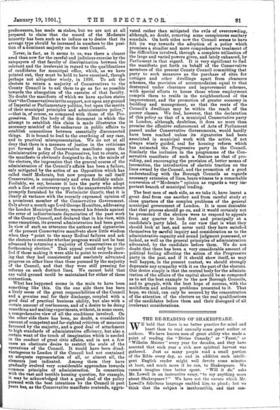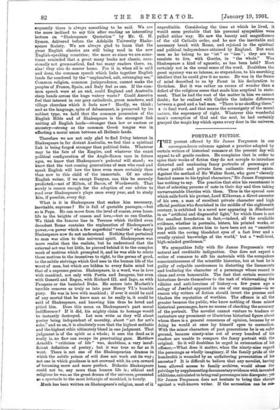THE RE-READING OP SHAKESPEARE.
WE hold that there is no better practice for mind and heart than to read annually some great author or authors. We have known men of great ability who made a point of reading the "Divine Comedy," or "Faust," or "Wilhelm Meister" every year for decades, and they have asserted that each year a rich new spiritual harvest was gathered. Just as many people read a small portion of the Bible every day, so and in addition each intelli- gent English reader might well devote some minutes at least, and much more if he can, to Shakespeare. We cannot imagine time better spent. "Will it do," asks Mr. Lowell in an instructive essay, "to say anything more about Shakespeare ? " We have not the excuse which Mr. Lowell's felicitous language enabled him. to plead ; but we think that tho subject is inexhaustible, and that con. sequently there is always something to be said. We are the more inclined to say this after reading an interesting lecture on "Shakespeare Quotation" by Mr. G. H. Symon, delivered before the Adelaide University Shake- speare Society. We are always glad to learn that the great English classics are still being read in the new English-speaking countries; the more so since we are some- times reminded that a great many books not classic, occa- sionally not grammatical, find too many readers there, as, alas! they also do nearer home. For it is, when all is said and done, the common speech which links together English lands far sundered by the "unplumbed, salt, estranging sea." Common religion, common jurisprudence, cannot make the peoples of France, Spain, and Italy feel as one. If the com- mon speech were at an end, could England and Australia clasp hands across the huge watery waste ? Could America feel that interest in our grey cathedrals, green meadows, and village churches which it feels now ? Hardly, we think ; and as the language, spite of debasement, is preserved by its noblest type, we hold that the common possession of the English Bible and of Shakespeare is the strongest link uniting all English lands—stronger than law or custom or ancestry—strong as the common Greek tongue was in effecting a moral union between all Hellenic lands.
Therefore we are not only glad to find living interest in Shakespeare in far distant Australia, we feel that a spiritual link is being forged stronger than political links. Whatever may be the fate of the Empire, and whatever the exact political configuration of the Anglo-Saxon race in future ages, we 'mow that Shakespeare's pedestal will stand; we know that the vast coming generations of men who read and speak English will bow the knee even more certainly then than now to this child of the immortals. Of no other English writer, if we except Bunyan, can this be securely predicted,—not of Milton, of Bacon, of Wordsworth. That surely is reason enough for the adoption of our advice to read over Shakespeare's plays once every year, and to study him, if possible, every day.
What is it in Shakespeare that makes him necessary, inevitable, supreme He is full of quotable passages,--but so is Pope. He can move from the level of coarse, even loose, life to the heights of reason and love,—but so can Goethe. We think the famous line in Terence which thrilled even decadent Rome contains the explanation of Shakespeare's power,—a power which a few superficial " realists " who decry Shakespeare now do not understand. Nothing that pertained to man was alien to this universal spirit. Sha.kespeane was more realist than the realists, but he understood that the external act was but little, he pierced behind it to the complex mesh of motives which prompted it, and he was able to relate those motives to the incentives to right, to the germs of good, to the subtle strivings which God sees in the human life of the worst of men, but which are hidden to every finite mind but that of a supreme genius. Shakespeare, in a word, was in love with mankind, not only with Portia and Imogene, but even with Goneril and Regan, with Richard III. and Lego, as with Prospero or the banished Duke. He enters into Macbeth's terrible remorse as truly as into poor Henry VL's humble piety. He was in love with mankind ; if ever it could be said of any mortal that he knew man as he really is, it could be said of Shakespeare, and knowing him thus he loved and pitied him. Does this mean on Shakespeare's part moral indifference ? If it did, his mighty claim to homage would be instantly destroyed. Let men write as they will about poetry being independent of morality, about "art for art's sake," and so on, it is absolutely sure that the highest testhetic and the highest ethic ultimately blend in one judgment. That judgment is of the spirit as a whole ; it sees the deed as it really is, no flaw can escape its penetrating gaze. Matthew Arnold's "criticism of life" was, doubtless, a very insuf- ficient definition of poetry; but it was true so far as it went. There is not one of the Shakespearian dramas in which the subtle poison of evil does not work out its way; not one in which goodness is not crowned with its own reward of becoming more and more perfect. Didactic Shakespeare could not be, any more than human life is ; ethical and religious he was, as the great drama of the universe, presented as a spectacle to the most lethargic of mankind, is hourly.
Much has been written on Shakespeare's religion, most of it unprofitable. Considering the time at which he lived, it would seem probable that his personal sympathies were pulled either way. He saw the beauty and magnificence of the old Catholic order, and he saw the inevitable and necessary break with Rome, and rejoiced in the spiritual and political independence attained by England. But such men as he belong to no " ist " or " ism "; they are too resolute to live, with Goethe, in "the whole." Was Shakespeare a Lind of agnostic, as has been held? Most certainly not in the usual sense of the word. Doubtless the great mystery was so intense, so stupendous, to his searching intellect that he could give it no name. He was in the frame of mind described to us by Faust in his declaration to Gretchen. But it was rather an excess of wonder than a defect of the religious sense that made him sceptical in state- ment. That he had the root of the matter in him we cannot doubt ; for he realised with Carlyle the infinite difference between a good and a bad man. "There is no shuffling there." s is final word, and that means the sovereignty of the moral nature, the supremacy of right. Whatever this wonderful man's conception of God and the soul, he had certainly grasped the magic key which opens every door in the universe.







































 Previous page
Previous page